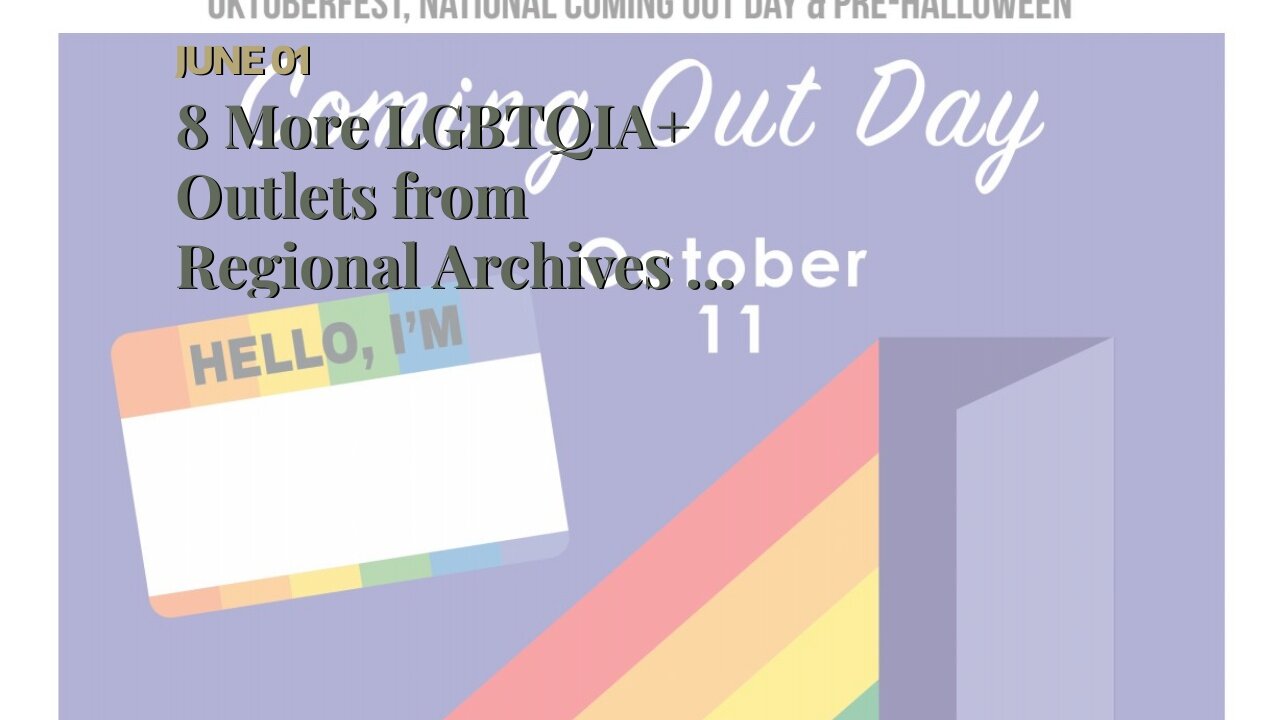Premium Only Content

8 More LGBTQIA+ Outlets from Regional Archives in Atlanta, Birmingham, Houston, and Beyond
8 More LGBTQIA+ Outlets from Regional Archives in Atlanta, Birmingham, Houston, and Beyond
(Photo by Alabama Forum, Atlanta Barb, Southern Voice, and OUT Front Magazine) In honor of Pride, Rotten Tomatoes is highlighting LGBTQIA+ voices, and a s part of the celebration, we ’re spotlighting some of the work our Archival Curation team has been doing to bring more LGBTQIA+ publications onto the Tomatometer. Pride is cause for celebration; it reflects joy, authenticity, fluidity, and community. Pride is rooted in political organizing and resisting attempts to diminish , silence , or erase us. Pride says: “We’re queer all year; always have been and always will be.” Pride should honor the multitudes of LGBTQIA+...
(Photo by Alabama Forum, Atlanta Barb, Southern Voice, and OUT Front Magazine) In honor of Pride, Rotten Tomatoes is highlighting LGBTQIA+ voices, and a s part of the celebration, we ’re spotlighting some of the work our Archival Curation team has been doing to bring more LGBTQIA+ publications onto the Tomatometer. Pride is cause for celebration; it reflects joy, authenticity, fluidity, and community. Pride is rooted in political organizing and resisting attempts to diminish , silence , or erase us. Pride says: “We’re queer all year; always have been and always will be.” Pride should honor the multitudes of LGBTQIA+ experiences and resilience.
In a year (series of years, really) marked by unprecedented legislative attacks on the LGBTQIA+ community – particularly trans and nonbinary folks – it feels especially important not just to revel in our joy and remember our roots, but to recognize that we have existed forever, even (and especially) in places that are or have historically been hostile to us. Since 2020, the Rotten Tomatoes Archival Curation team has sought to find queer outlets in the archives – to learn and amplify what LGBTQIA+ critics have been saying about movies and television since the industry’s inception. Last year’s spotlighted publications included Drag , which centered on drag ball culture and trans+ civil rights; Women in the Life , a periodical produced by Black queer women and femmes; Vice Versa , the earliest known lesbian newsletter in America; and The Advocate , the oldest still-active queer outlet in the country.
Despite efforts to erase queer (as well as Black and Brown) history from schools, to shut down drag, and to limit access to gender-affirming healthcare that saves our lives, LGBTQIA+ communities have always existed in every corner of the United States and the globe. The following American regional publications, especially those from southern and midwestern cities, are evidence that queer people have always been everywhere – cultivating community, creating records of and for ourselves, and doing what cinephiles everywhere love to do: debating, writing, and talking about the movies. (Photo by 5th Freedom) 5th Freedom (1970-1983) – Buffalo, NY Much of queer culture and history is created by local organizers, often in response to attempts to quash or eradicate the LGBTQIA+ community. Perhaps the best-known example of this is the Stonewall Riots, which are now honored yearly with Pride marches, but other similar events took place across the country in the same era, such as at The Black Cat Tavern in Los Angeles in 1967 and the Tiki Bar in Buffalo. In response to police efforts to shut down LGBTQIA+ spaces in Buffalo, local queer organizers rallied to create the Mattachine Society of the Niagara Frontier, which protested police harassment and created 5th Freedom. 5th Freedom was published biweekly beginning in 1970 through the 1980s, and it covered grassroots organizing as well as the AIDS epidemic in Buffalo and across the nation. The periodical was named for the “five essential freedoms” outlined in Come Out!, a publication created by the Gay Liberation Front: freedom from want, freedom from fear, freedom of religion, freedom of speech, and freedom to love. 56% Making Love (1981) Fresh: “Even if it’s a flop among general audiences, Making Love is going to have an impact on many closeted gays… It presents, perhaps unintentionally, some fairly probing issues to the gay man watching the film.” — Rod Hensel, February 1982 32% Funny Lady (1975) Rotten: “I dig Barbara as much as everybody else does, but I cannot tell a lie. I can’t say her latest movie colossus, ineptly titled Funny Lady (being neither funny nor ladylike), is great or good or even fair. It’s just plain awful and ther...
-
 1:00:33
1:00:33
The Dan Bongino Show
4 hours agoTruth Returns To The White House Press Room (Ep. 2411) - 01/29/2025
520K963 -
 1:01:33
1:01:33
Grant Stinchfield
2 hours ago $0.78 earnedVague Details: An Effort to Avoid Panic Over Drones & "The Research"
11K6 -
 LIVE
LIVE
Barry Cunningham
14 hours agoWATCH LIVE: RFK JR. CONFIRMATION HEARING! ROBERT F KENNEDY JR TESTIFIES BEFORE SENATE
1,901 watching -
 LIVE
LIVE
The Dana Show with Dana Loesch
1 hour agoTHE TRUTH ABOUT TRUMP'S FREEZE | The Dana Show LIVE On Rumble!
607 watching -
 58:59
58:59
The Rubin Report
3 hours agoWatch Stephen Miller Destroy CNN Host’s Narrative with Facts in Only 2 Minutes
48.7K35 -
 4:09:28
4:09:28
Benny Johnson
4 hours ago🚨Robert F. Kennedy Jr. Confirmation LIVE Right NOW | Fauci and Big Pharma PANIC Over RFK!
129K238 -
 2:03:48
2:03:48
LFA TV
18 hours agoRFK CONFIRMATION & MORE! | LIVE FROM AMERICA 1.29.25 11am
52.5K13 -
 1:30:43
1:30:43
The Shannon Joy Show
3 hours ago🔥🔥Live Exclusive With Dr. Peter McCullough! RFK Jr. Confirmation Coverage & More!🔥🔥
17.9K2 -
 2:07:01
2:07:01
Steven Crowder
5 hours agoTrump’s Funding Freeze: Fact-Checking the Mainstream Media Lies
354K203 -
 DVR
DVR
Bannons War Room
1 year agoWarRoom Live
110M